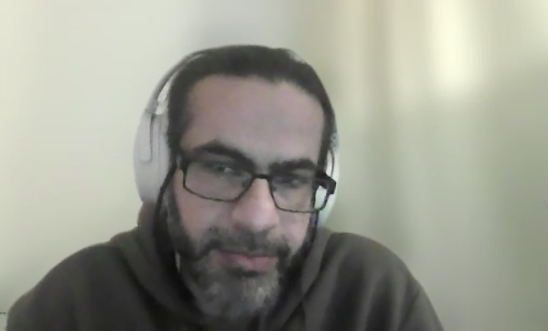
Ali Abdulemam (Bahrain) - 6 February Meeting Highlights - Sutton Amnesty

At the February meeting we were pleased to welcome Ali Abdulemam. Ali is a prominent Bahraini Human Rights Activist who was convicted in absentia for plotting to overthrow the Government, and sentenced to 15 years in prison. In 2013, Ali escaped to the UK where he was swiftly granted political asylum. He now works tirelessly to highlight the Human Rights situation in his country.
Ali gave an overview of the history of Human Rights in Bahrain to provide context for today’s situation. Essentially, the governing regime had relied on slavery for hundreds of years, with corruption and oppression being the norm. As a result there were uprisings roughly every decade. Ali mentioned the historical role of the British government, specifically Ian Henderson, in shaping the security aspects of the regime, with his strong emphasis on brutal repression of uprisings and systematic torture. He also established the unhealthy relationship between the Ministry of the Interior and the various security agencies. If you are interested in reading more, there are plenty of articles on the internet about “The Butcher of Bahrain”.
In August 2010 the government targeted those considered to be activists, resulting in 500 arrests. Ali himself was tortured, held in solitary confinement with no access to a lawyer and forced to sign a confession. During the Arab Spring, people in Bahrain took to the streets to protest for democratic reforms. The so-called "Bahrain Uprising" was brutally crushed with the help of troops from Saudi Arabia and the UAE. Although many were released after the uprising, the amnesty was short lived. After Ali’s release in February 2011, Ali’s house was raided again, whereupon he hid for two years before escaping.
In 2011 an investigation into Human Rights in Bahrain led by Human Rights lawyers established that:
- torture is systematic
- within 3 months more than 5 prisoners died under torture
- there is no alternative to fight the system as courts do not really exist and the lack of free media means that violations are not exposed. People rely on unofficial media, WhatsApp and Twitter to share knowledge and experiences. All local media and newspapers are owned by the Royal Family.
Ali estimates there are currently around 1200 political prisoners in Bahrain - some were released from prison but remain under house arrest. In addition, since 2011 thousands who fear arrest and torture have fled Bahrain.
Our Chair raised the case of dual Bahraini-Danish national and prisoner of conscience Abdulhadi Al-Khawaja, who is serving a life sentence. He is described by the Index on Censorship as one of the best-known human rights activists in the world, is the co-founder of the Bahrain Centre for Human Rights and a vocal critic of the government. Al-Khawaja was part of Amnesty International's fact-finding mission in Iraq, and has been a researcher and project consultant for Amnesty and other international organizations.
This case was included in one of the urgent actions circulated by our Secretary before the meeting, and was the subject of recent social media posts by the Group.
Ali explained that he knew Al-Khawaja, as they were both part of the group of 21 prominent Bahraini opposition figures who were tried in front of a military court in June 2011, accused of plotting a coup against the Bahraini government. Ali also knows Hassan Mushaima, another of the group whose case has been taken up by Amnesty https://www.adhrb.org/2014/03/hassan-mushaima-marchs-champion-for-justice/ Hassan’s son Ali Mushaima lives in London, and in 2018 began a hunger strike outside the Bahraini embassy there, protesting the denial of medical treatment for political prisoners, including his father Hassan. A complete list of the 21 can be found at http://www.bahrainrights.org/en/node/4029, and a search of the internet with the term “Bahrain 13” will yield many more background articles.
It transpires that Ali also knew Alaa Abdelfattah, our Egyptian POC case, since 2007. They met at a “blogging” conference on human rights in 2007, and then again at similar conferences in Hungary and Egypt. When Ali was arrested in 2010, Alaa worked to try and free him, by writing about his case, demanding Ali’s freedom. Both promised to meet each other when Ali was released in 2011, but by then Alaa had himself been arrested in Egypt, and Ali had to flee to the UK. Ali has been working with Alaa’s family to try and free him all these years, attending conferences where the British Government is present to try to pressure it to support the release of Alaa so he can come to the U.K. to join his wife and family. Unfortunately this case has a very high profile internationally and has become a very personal issue for the President of Egypt. Ali believes that the British government is not taking enough action to protect its imprisoned citizens abroad, particularly Alaa.
Ali is on social media so we can follow him on twitter @abdulemam. He actively works with various organisations and NGOs and will keep in touch with the group with ideas on how we can help.
0 comments